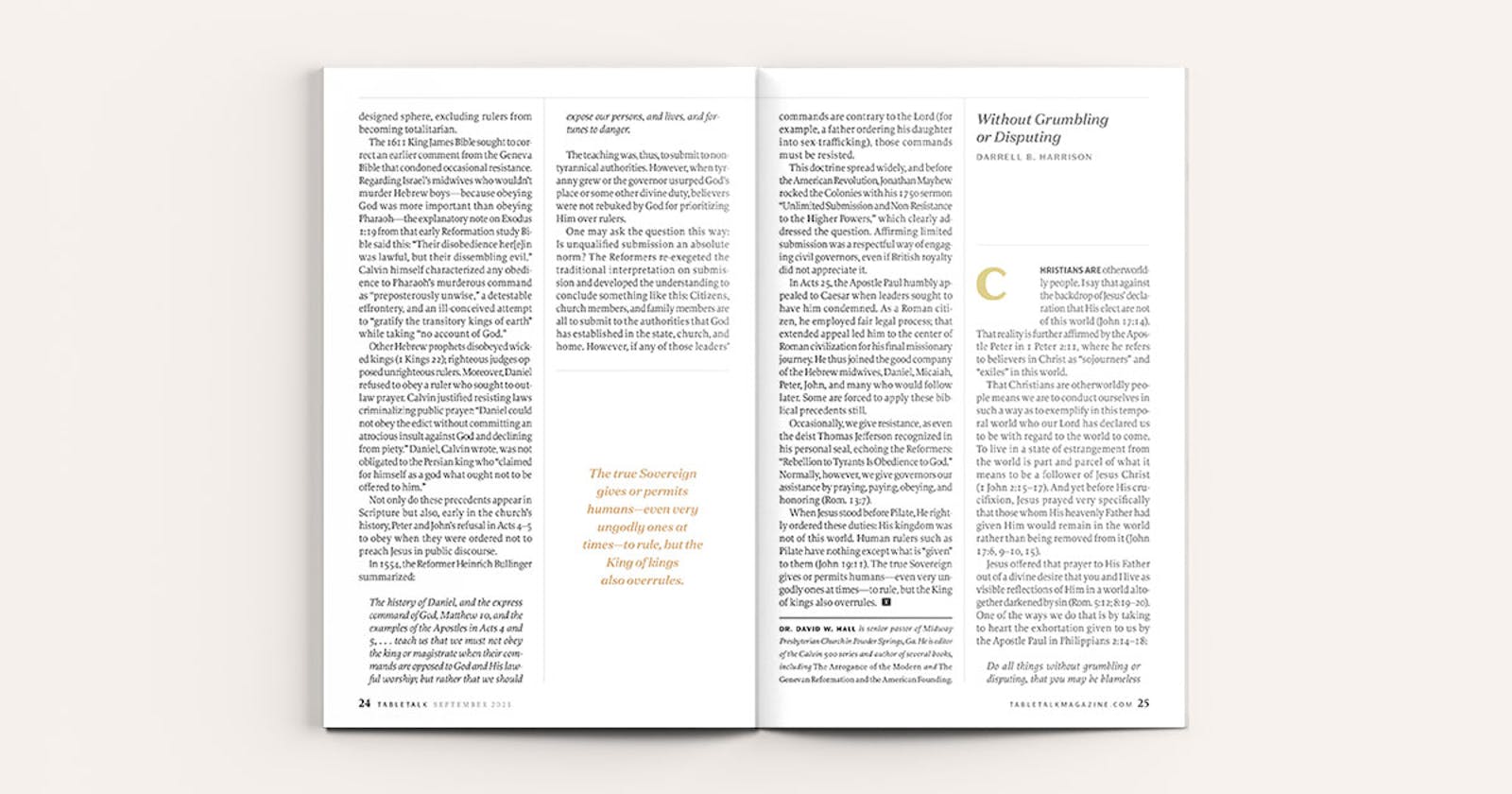
Request your free, three-month trial to Tabletalk magazine. You’ll receive the print issue monthly and gain immediate digital access to decades of archives. This trial is risk-free. No credit card required.
Try Tabletalk NowAlready receive Tabletalk magazine every month?
Verify your email address to gain unlimited access.
Christians are otherworldly people. I say that against the backdrop of Jesus’ declaration that His elect are not of this world (John 17:14). That reality is further affirmed by the Apostle Peter in 1 Peter 2:11, where he refers to believers in Christ as “sojourners” and “exiles” in this world.
That Christians are otherworldly people means we are to conduct ourselves in such a way as to exemplify in this temporal world who our Lord has declared us to be with regard to the world to come. To live in a state of estrangement from the world is part and parcel of what it means to be a follower of Jesus Christ (1 John 2:15–17). And yet before His crucifixion, Jesus prayed very specifically that those whom His heavenly Father had given Him would remain in the world rather than being removed from it (John 17:6, 9–10, 15).
Jesus offered that prayer to His Father out of a divine desire that you and I live as visible reflections of Him in a world altogether darkened by sin (Rom. 5:12; 8:19–20). One of the ways we do that is by taking to heart the exhortation given to us by the Apostle Paul in Philippians 2:14–18:
Do all things without grumbling or disputing, that you may be blameless and innocent, children of God without blemish in the midst of a crooked and twisted generation, among whom you shine as lights in the world, holding fast to the word of life, so that in the day of Christ I may be proud that I did not run in vain or labor in vain. Even if I am to be poured out as a drink offering upon the sacrificial offering of your faith, I am glad and rejoice with you all. Likewise you also should be glad and rejoice with me.
It is our tendency as Christians to view our sinfulness primarily in terms of acts we commit in disobedience to God. But in the passage above, Paul is reminding us that our attitude is just as important as our actions, if not more so. Every sinful deed is preceded and accompanied by a sinful disposition. A biblical case in point is Genesis 4:6, where God asked Cain before he killed his brother Abel, “Why are you angry?” From God’s perspective, Cain had already murdered Abel in his heart before he murdered him with his hands (Matt. 5:21–22).
The nineteenth-century Baptist preacher Charles Haddon Spurgeon said, “Frequently the murmuring against man is only a covert way of murmuring against God.” I can’t help believing that in saying those words, Spurgeon had in mind the Israelites who “murmured in their tents” against Moses and Aaron out of an attitude of jealously toward them (Ps. 106:16–25). Scripture defines “murmuring,” which is the same word as “grumbling,” as secret displeasure of the heart that is not openly avowed. It is precisely that kind of hidden heart-attitude that the Apostle Peter is addressing in 1 Peter 4:9, where he encourages believers to “show hospitality to one another without grumbling.”
The degree to which you and I remain faithful in carrying out Paul’s Apostolic charge is as much a matter of our attitude as it is of our behavior. The act of grumbling and disputing is born from an attitude of discontentment. Conversely, discontentment is the attitudinal byproduct of a heart that is oriented toward pleasing self rather than God. It is the latter of those two motives—pleasing God—that Paul is encouraging believers to adopt as they strive to illuminate this lost world with the light of the gospel of Jesus Christ. That is not to suggest, however, that consistently maintaining such a Christ-centered mindset is easy (Col. 3:1–2).

Though we may find it difficult to admit, we nonetheless must confess that, as sinners, we are selfish by nature. Even when it comes to our obedience to God, we sometimes wonder, “What’s in it for me?” Thankfully, the Apostle Paul answers that question for us: we will one day be able to stand unashamed in the presence of our glorious Lord and Savior knowing that we did not run in vain or labor in vain in serving Him.
The beloved Welsh preacher and theologian D. Martyn Lloyd-Jones described Christians as “living epistles for the Lord Jesus Christ, known and read of all men.” If, as followers of Christ, you and I are to be “known and read” by others, it stands to reason, then, that we must be seen and observed by them. And what better way to ensure that happens than to shine the light of the truth of the gospel to a world in such desperate need of it—not only in our actions but in our attitudes as well.
